Listen here for a few short excerpts from Martin’s story:
I was born in Pelican Narrows in Northern Saskatchewan, on reserve land of the Peter Ballantyne Cree Nation. I grew up in an alcoholic home. My parents were brought up the same way as me, so they could only teach us kids the life skills that they received, which wasn’t much. When my dad drank he stayed home – but when my mom drank, she would be gone for days at a time. Sometimes we didn’t see her for a week. My dad never said out loud that he loved us, but at least he was always there. When I was growing up I developed a lot of anger towards my parents. And because there were so many of us kids in the family, I always felt that I wasn’t important; that I was invisible.
I remember that our house, especially when my parents drank, was a total mess. There was always stuff all over the floor, and I remember the floor being wet all the time. At night, we kids slept on the floor with blankets. We had a wood stove, but I sure remember how cold it was in the house in the winter, especially at night.
Sometimes other drunks would come and kick the door open, so we were always living in constant fear. We never felt very protected by our parents. You couldn’t help feeling kind of abandoned most of the time. Basically my older sister, who was about four years older than me, was the one watching over us.
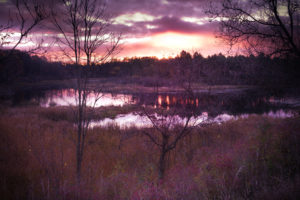 I do have good memories of going out on the trap line with my dad, mostly hunting lynx. That’s where it seemed like things were more normal. My mom would talk to us. We all had jobs to do, so we felt needed. That was my favourite time, living outdoors and helping my dad and my brothers with the trap lines. I always dreaded it when it was time to go back to the reserve. I knew I would feel invisible again.
I do have good memories of going out on the trap line with my dad, mostly hunting lynx. That’s where it seemed like things were more normal. My mom would talk to us. We all had jobs to do, so we felt needed. That was my favourite time, living outdoors and helping my dad and my brothers with the trap lines. I always dreaded it when it was time to go back to the reserve. I knew I would feel invisible again.
I always believed in God. But I believed that God was way out in the distance, doing important things. And I wasn’t important, so why would He bother with me?
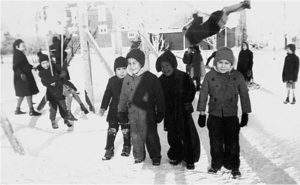
Prince Albert Residential School – from the General Synod Archives, Anglican Church of Canada; P75-103-S7-292
I was sent away to school in Prince Albert. It was the last stage of the residential schools. At that time the school in Prince Albert was operated by Indian Affairs. But there were still a lot of people that went to residential school themselves who were the ones supervising us kids – sick people, right? So they really put us through a lot. I couldn’t even study; I couldn’t even do anything. I had a chance to get my education, but because of the amount of the abuse – I didn’t go through sexual abuse, but a lot of mental abuse – I never had a chance to learn what I wanted to learn. And then I just kept running away from there, and every time they caught us they would bring us back, and they would beat us. It was just like that, over and over. And then finally, they left us alone. I ended up back on the trap line and the reserve. It was a harsh world. The supervisors at the school who were in control, watching the kids, they would line us up for the shower. It was almost like an army setting. They would get us to stand beside our beds at night. And there were kids from different reserves there, teasing each other, ridiculing each other, beating each other up. It was just not a good place. I ended up hating people more, when I came out of there, more than anything else.
So after that, it was almost like something was pushing me back from having a life that I longed for. It was almost like, whenever good things started to happen I would do something to sabotage them, because I didn’t feel like I deserved them. I would get into friendships or relationships and then I would mess that up because I felt like I wasn’t worthy.
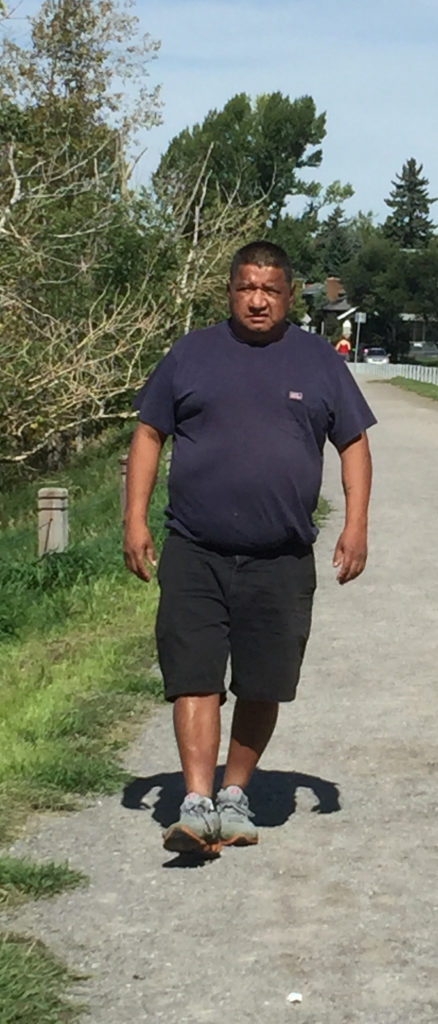 By the time I was sixteen I ended up in prison, because I accidentally killed my own brother. We were drinking and playing with guns at a party, and there was an argument. Somebody fired a shot, and so I fired a shot to scare them off. I wasn’t trying to hurt anybody. I was so drunk, but I remember I heard a scream and then I saw my brother and suddenly everyone was scattering and screaming. I didn’t know what was happening. I realized that I’d shot my brother, and he was lying there, bleeding. Nobody knew anything about CPR, everyone was scared, nobody was trying to help, they were all just running around in confusion. I didn’t know what to do either.
By the time I was sixteen I ended up in prison, because I accidentally killed my own brother. We were drinking and playing with guns at a party, and there was an argument. Somebody fired a shot, and so I fired a shot to scare them off. I wasn’t trying to hurt anybody. I was so drunk, but I remember I heard a scream and then I saw my brother and suddenly everyone was scattering and screaming. I didn’t know what was happening. I realized that I’d shot my brother, and he was lying there, bleeding. Nobody knew anything about CPR, everyone was scared, nobody was trying to help, they were all just running around in confusion. I didn’t know what to do either.
The police picked me up and took me to jail, but the ambulance that picked my brother up didn’t come for about 45 minutes, and by that time my brother had lost a lot of blood already.
I remember they came in to the jail and said, “Your brother died.” I felt like my chest was caving in. I started screaming because I couldn’t believe that this whole thing was happening. Next thing I know, they started injecting me with something to calm me down.
There was always an ugly kind of force that was hanging over me after that. I started having terrible nightmares. People would come to me in my dreams and then melt in front of me, and become skeletons. And I would wake up and be scared and the guards would run in and inject me with a sedative again. It seemed easier to die than to be suffering like that.
One day I was sitting in my cell when a Salvation Army guy came in there. I didn’t know who he was. I thought he was a police officer, because he was wearing that hat. I was from the reserve, right? I’d never seen anything like that. What is this guy doing here, you know? He started telling me about Jesus. And as he talked, I started to feel a wave of God’s presence coming in me, and it was melting everything inside of me. I felt clean, like a little baby. Then he said to me, “Do you want to pray with me?” And for the first time in my life, I cried. I cried like a little baby.
I was 19 years old, and I had hardly any education. I had spent so much time on the trap line that I could barely read. But there was a Bible in my cell. And after the prayers of that Salvation Army guy, something was drawing me to that Bible. I didn’t really understand it – I might have picked up a word here and there – but over time I was able to understand more and more. And that’s how I learned how to read.
About a year and a half later I ended up going to court. The judge looked at me and said, “You know what, son? Right now I could give you ten years in prison, but I see something in you and I don’t want to waste your life, so I’m only going to give you three years less a day.”
The thing was, I never intended to kill or hurt anybody, and I guess the judge realized that. So I ended up in prison for three more years, and that’s when I started my education.
I started working in a Catholic chapel in the Drumheller Penitentiary. There was a Sister there; she must have been about 4 foot something, very little. I worked with her and I used to enjoy just being around her. It would only take me about 45 minutes to clean the entire chapel, but I’d spend the whole day there. I’d read, I’d listen to music, I’d talk to the Sister, and I’d ask her all kinds of questions.
When I got out of prison, I got a job and moved to Brooks. But the Christians I was living with were very legalistic, and I wasn’t that kind of person. I didn’t know how to follow rules, and it seemed like I didn’t know how to do anything right. When I was in prison, I felt accepted for who I was. But when I got thrown in with these people who kept saying you gotta do this, you gotta do that, it was like you have to do things for God in order for him to do things for you. Because of all that pressure, I didn’t do so well, and I got back into the old bad habits and lifestyle. I felt condemned about everything that I had started to feel forgiven about. I was feeling lost again.
I ended up moving to the Yukon. I lived there for twenty years or so, and that’s when my alcoholism really began to explode. I would sometimes sober up for a few months, but I’d always get back into drinking again. I got into some relationships, and I even became a father, but I’d always be drinking.
I hadn’t really forgiven myself for killing my brother. I remember one evening I went to bed, I was drinking and I actually had this dream where there were these stairs that were kind of illuminated. I started climbing these steps, and the more I climbed the weaker I got. All the strength was sapped out of me, and I thought I might as well give up; I don’t have what it takes to climb anymore. So I began to fall back, and as I was falling back, someone grabbed hold of me from the back and my whole body was swinging back and forth, and I was wondering what was happening. I looked – and it was my brother. He looked at me and I could see love in his eyes. “Keep going,” he said, and he pushed me back to the steps. I remember grabbing onto the steps, and you know what, I never looked back to look at him. I just grabbed on and started climbing. I remember waking up, and that day, that time, I said I’d better do something about my life.
I found out about a treatment centre, for people who are lost but want to do better. I met this Catholic lady there, and she became a good friend to me. She helped me so much. Even when I failed, when I ended up in detox again, she just kept loving me, loving me, loving me. She would visit me and buy me smokes. We’d have long talks but she’d never scold me or tell me that I had to change…she’d just listen to me.
Years later, when I moved to Calgary, I would think about her love – that if she could love me like that, then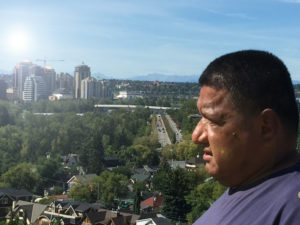 maybe God could, too. Maybe God was different from what I thought. So many times I could have been dead, but maybe God had a purpose for my life. And somehow, thinking about that helped me move out of being in denial about everything that had happened to me. I always blamed everyone else for my problems. It was society’s fault, or the police’s fault, or my parents’ fault, or the hospital’s fault for not getting to my brother in time to save him – never my fault. I was blind about that.
maybe God could, too. Maybe God was different from what I thought. So many times I could have been dead, but maybe God had a purpose for my life. And somehow, thinking about that helped me move out of being in denial about everything that had happened to me. I always blamed everyone else for my problems. It was society’s fault, or the police’s fault, or my parents’ fault, or the hospital’s fault for not getting to my brother in time to save him – never my fault. I was blind about that.
Then one day I was sitting at Tim Horton’s. It was exactly two years ago this September. I was kind of at a dead end – I didn’t know how to sober up. Everything I valued in my life was gone. My relationship with my daughters was totally broken. Even drinking wasn’t giving me the same high, because whenever I drank I would have seizures. I figured I was going to die soon, even though I was only 50 years old. But I was starting to realize that God truly loved me. So I prayed, “God, if there’s anything in my life you want to use, please use it.”
That little prayer set me free. I had never really allowed anyone to love me, because I was afraid they’d hurt me. But when I started to allow God to love me, I found out that he didn’t point out my mistakes. He loved me in spite of my mistakes. He loved me because I was the only copy of me – there isn’t anyone else like me, and God loved me for that. And when I started to see that, I was set free from drinking, set free from smoking, set free from gambling, set free from my fears.
I got help from the Calgary Dream Centre and their Supportive Housing Program. I went to Twelve-Step Recovery meetings at Calgary Centre Street Church called “Freedom Sessions”. It was all based on the Bible. And I haven’t had a drink in two years, since that day at Tim Horton’s.
I’ve still got some struggles, but it’s nothing compared to what I went through most of my life. And so, it’s been a great journey for me. God has completely restored my relationships with my daughters.
I still struggle with God’s love. It’s been many years of abuse, and feeling that God was against me. But he’s definitely changing me. I just need to be patient, to relax. I know that he’s there, just like my dad, right? I knew he was there, but sometimes he wouldn’t talk or wouldn’t say anything. So there is that void that’s still happening in my life sometimes. I guess this is where I need to develop my relationship with God, but I don’t feel that, you know, invisible anymore. I just feel that I’ve got a long road ahead of me, to learn, right? I’m more beginning to live my life, after 50 years of living. I’ve only been really living it for two years. I’m only two years old, I guess! But God is a lot closer than the air that we breathe. He’s there, but he’s not there to command right. He’s there to take care of my needs.
I’ve never been hungry since I’ve sobered up. I’ve never had to go without a shower. I have a bed. I have a home. I have things I never had before, when I was drinking. I don’t have to wake up sick in the morning. I don’t have to worry about what happened yesterday. I remember what happened yesterday. I don’t have to worry about owing anyone any money and somebody chasing me around. So there’s a lot of things, you know, that I’m set free from. I worry less, right?
I look at the lives of some of my friends. They died in their addiction, their pain, and their struggles. So I’m thankful that God brought me through so much confusion, so much garbage, in order to be who I am today. Now, I belong to God, and to His family.


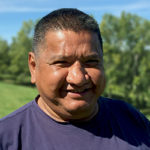
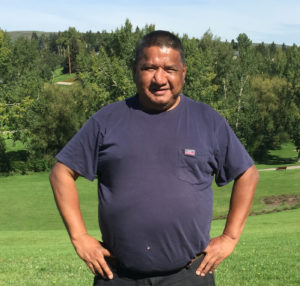






Martin you have done so well I am proud of you for the way you have kept honoring Jesus and continuing to work and stay away from the alcohol
I knew Martin when he lived in the Yukon. He struggled but never gave up. We would drink but we always knew there was something more. Perhaps he knew that more than me because I still choose to drink. Despite this l would like to say l am very proud of Martin and his accomplishments. His story brought tears to my eyes. Keep climbing, Martin.
I am proud of you Father Sewap. I am glad you are my father.